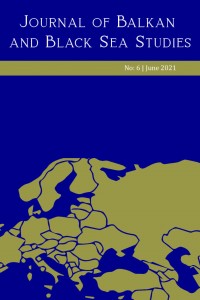Abstract
The Balkan Wars of the year 1912/1913, which had its epicentre the Vilayet of Kosovo, ended in 1999, marking the conclusion of the last chapter of the Versaille’s Yugoslavia that was created on the ruins of two empires: the Ottoman and Austro-Hungarian Empires. Kosovo, which was a composition of the Ottoman Empire, after five centuries was conquered by Serbia and Montenegro in the first Balkan War of the year 1912 and after nine decades under the Belgrade’s repressive regime, declared its independence on 17th of February 2008.
The independence of Kosovo comes as a correction of compromise of the European Powers at the London Conference. Remaining of the Vilayet of Kosovo under Serbia was the most unjust and unfair border for the Albanians, but since it was a compromise of the European concert, the aim was to preserve the European peace and prevent war between Austro-Hungary and Russia. But this tragic compromise for Kosovo Albanians made that European peace ephemeral, as two years later started the World War I. The Ottoman Empire dissolution and European powers’ unwillingness at the London Conference to correct what had to be corrected, paved way for confrontation on the global scale, the outbreak of the World War I. One hundred years later, this part of the Balkans, once known as the European part of the Ottoman Empire, continues to be the key of the European Stability from the geo-cultural as well as the geo-political perspective. Especially the future of Albanians, who live in Kosovo, Albania, Macedonia, Montenegro and Serbia, is the key of the Balkans. Along with the European decision- making centres, especially after dissolution of Yugoslavia and the end of the Cold War, we have a redefinition of their geo-strategic position, and therefore regain a new international dimension. Besides Turkey, recently there emerges a more intensive role of Germany, which for Kosovo and the Albanians in general is of the vital interest.
If it has always been considered that the position of the German interest ends somewhere at today’s Croatia borders, Middle Bosnia Line, Sanxhak-Kosovo-Albania-Macedonia and Bulgaria to today’s Turkey, once as the Ottoman Empire, it is the vital artery of geo-politics and geo-culture of the Balkans.
Therefore, the achievement of Kosovo independence shall make the Albanian factor more important than ever in the region since the Balkans wars of years 1912/1913. In this context, consolidation of this generation, where the Albanians are majority, not only paves the way greatly reducing Serbia’s impact in the Balkans, but also creates favourable preconditions for new relining in the region. In a word, Kosovo shall be a sort of barometer of the Balkans policy for many European countries. By this work, we aim to describe consequences of the Balkan wars in the Albanian lands, respectively in Kosovo, its partition by the Serb and Montenegrin troops. We try to illustrate the long way of Kosovo since the dissolution of the European part of the Ottoman Empire all the way to the proclamation of its independence in 2008, and its geo-strategic importance to dynamic redefinition in the regional and European scene after the end of the Cold War and the dissolution of Yugoslavia.
Keywords
References
- Sundhaussen, Holm: Eine Konfliktgeschichte, in: Konrad Clewing/Jens Reuter: Der Kosovo Konflikt. Ursachen, Verlauf, Perspektiven, München, 2000, p. 67-69
Abstract
References
- Sundhaussen, Holm: Eine Konfliktgeschichte, in: Konrad Clewing/Jens Reuter: Der Kosovo Konflikt. Ursachen, Verlauf, Perspektiven, München, 2000, p. 67-69
Details
| Primary Language | English |
|---|---|
| Journal Section | Articles |
| Authors | |
| Publication Date | June 30, 2021 |
| Published in Issue | Year 2021 Issue: 6 |


